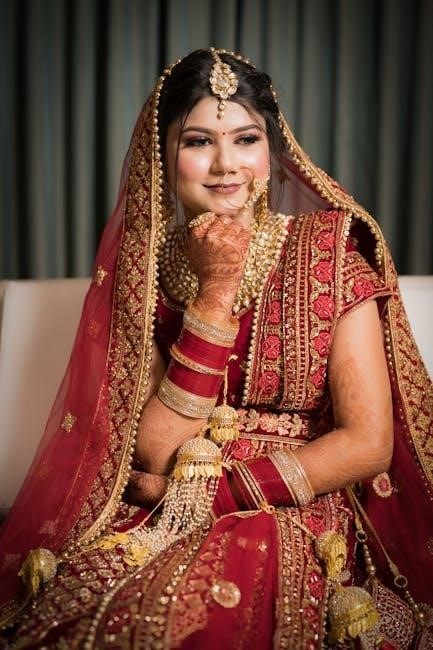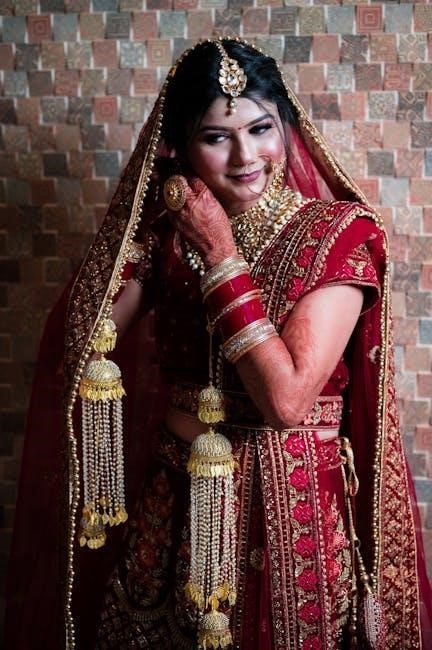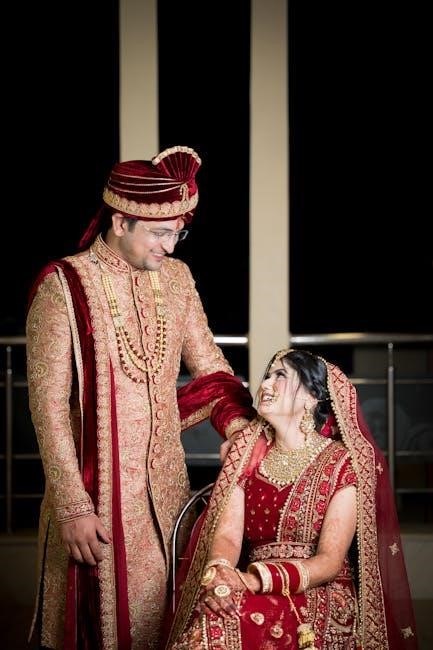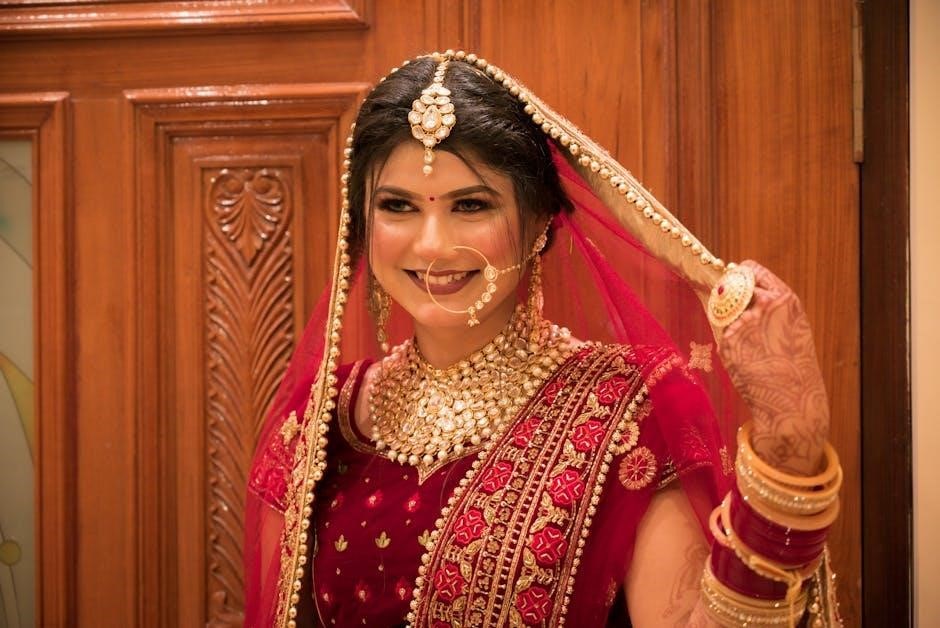Marriage is a profound institution, representing a lifelong commitment between two individuals. It signifies unity, love, and mutual support, transcending cultural and temporal boundaries. At its core, marriage embodies a deep emotional and spiritual connection, fostering growth and stability for both partners. Its meaning evolves, yet its essence remains a cornerstone of human relationships and societal structure.
1.1. Definition and Universal Significance

Marriage is a bond between two individuals, often formalized through legal, emotional, or spiritual commitments. Its universal significance lies in its role as a foundation for family and society, promoting stability and mutual support. Across cultures, marriage symbolizes unity, responsibility, and enduring love, reflecting its profound impact on human relationships and societal structures globally.
1.2. Historical Context and Evolution
Marriage has deep historical roots, evolving from ancient practices focused on alliances and property to modern emphasis on love and companionship. Early societies often viewed marriage as a means of securing social stability and economic ties. Religious and legal frameworks later shaped its structure, with shifting norms over centuries reflecting changing societal values and cultural expectations.

Cultural Perspectives on Marriage
Marriage varies significantly across cultures, reflecting diverse values, traditions, and societal norms. Each culture uniquely defines the institution, influencing rituals, expectations, and roles within marriage.
2.1. Marriage Across Different Societies
Marriage is a universal institution, yet its expression varies widely across societies. In some cultures, it is a union arranged by families, while in others, it is based on romantic love. Eastern societies often emphasize harmony and balance within the family, while Western societies focus on individual goals and personal fulfillment. These variations reflect differing societal norms, values, and expectations surrounding marriage and partnerships.

2.2. Rituals and Ceremonies in Various Cultures
Marriage rituals vary significantly across cultures, reflecting unique traditions and values. In Hindu ceremonies, the saptapadi (seven steps) symbolizes lifelong commitment. Western weddings often feature vowel exchanges and ring ceremonies. African cultures incorporate vibrant dances and communal celebrations. These rituals not only unite couples but also strengthen societal bonds, showcasing the diversity and richness of global marriage traditions and their deep symbolic meanings.

Religious Views on Marriage
Religious teachings often depict marriage as a sacred institution, reflecting divine will and moral values. Christianity, Islam, and other faiths emphasize fidelity, unity, and spiritual growth through marital commitments.
3.1. Christian Teachings on Marriage
Christian teachings emphasize marriage as a sacred covenant between two individuals, symbolizing Christ’s love for the church. It underscores unity, selflessness, and spiritual growth, encouraging couples to embody love, forgiveness, and mutual respect. Marriage is viewed as a divine partnership, fostering emotional and spiritual intimacy, and reflecting God’s plan for humanity.
3.2. Perspectives from Other Major Religions
Major religions offer diverse insights into marriage. Hinduism views it as a sacred duty and social bond, while Islam emphasizes mutual love and respect within a divine institution. Judaism sees marriage as a partnership fostering companionship and continuity. Each tradition highlights commitment, harmony, and spiritual growth, reflecting universal values despite cultural differences.

Legal Aspects of Marriage
Marriage is a legally recognized union, establishing rights, responsibilities, and obligations. It provides a framework for property, inheritance, and legal benefits, formalizing commitment.
4.1. Marriage Laws and Regulations
Marriage is a legal institution governed by laws that outline requirements, rights, and responsibilities. These laws vary by jurisdiction but typically cover age, consent, and procedures for a valid marriage. They aim to protect the rights of spouses and children, ensuring legal benefits like inheritance and property rights. Regulations differ regionally, balancing individual and societal needs while providing a framework for resolving disputes.
4.2. Rights and Responsibilities in Marriage
Marriage entails a balance of rights and responsibilities, fostering mutual respect and support. Both partners share duties like emotional support, financial decisions, and raising children. Responsibilities include maintaining trust, fidelity, and open communication. Rights involve equality, shared decision-making, and personal autonomy. These elements create a foundation for a healthy, balanced relationship, ensuring both partners grow together while honoring their commitments to one another.
Psychological and Emotional Dimensions
Marriage fosters deep emotional connections, mutual support, and personal growth. It requires effective communication, empathy, and understanding, creating resilience and strengthening the bond between partners.
5.1. Love, Intimacy, and Connection
Love and intimacy form the heart of marriage, fostering a deep emotional bond between partners. Connection is nurtured through shared experiences, vulnerability, and open communication. Intimacy extends beyond the physical, encompassing emotional closeness and mutual understanding. This connection strengthens trust and creates a safe space for personal growth, enabling couples to navigate life’s challenges together with resilience and unity.
5.2. Conflict Resolution and Communication
Effective communication is the backbone of resolving conflicts in marriage. Active listening, empathy, and clarity help couples address disagreements constructively. Open dialogue fosters understanding, allowing partners to navigate challenges together. Conflict resolution strengthens bonds when approached with patience and respect. Compromise and mutual understanding are key to maintaining harmony. Poor communication can escalate tensions, while healthy dialogue promotes resolution and deeper connection, enriching the marital relationship.

The Role of Commitment in Marriage
Commitment is the foundation of marriage, representing a mutual promise of loyalty and perseverance. It fosters trust, stability, and growth, ensuring partners stand together through life’s challenges.

6.1. Understanding Lifelong Devotion
Lifelong devotion in marriage is a sustained commitment to love and support one another through all phases of life. It embodies a profound spiritual and emotional bond, where partners become an extension of each other. This enduring promise fosters resilience, trust, and unity, mirroring the divine relationship between God and humanity, as highlighted in Timothy Keller’s insights on marriage.
6.2. Maintaining Trust and Fidelity
Trust and fidelity are cornerstones of a enduring marriage, requiring consistent effort and commitment. Open communication, transparency, and mutual respect foster a bond where both partners feel secure and valued. Fidelity extends beyond physical loyalty, encompassing emotional and mental dedication. By prioritizing these values, couples build a resilient relationship that withstands life’s challenges, reflecting the profound promise at the heart of marriage.

Marriage as a Foundation of Society

Marriage serves as a cornerstone of societal stability, fostering family units that contribute to social cohesion and economic cooperation. It provides a structured environment for raising children, ensuring the continuity of cultural values and norms. As a foundational institution, marriage supports the overall well-being of communities, reinforcing mutual support and shared responsibilities.
7.1. Family and Social Stability
Marriage fosters family and social stability by creating a nurturing environment for children and reinforcing shared values. Stable families contribute to reduced social fragmentation, promoting community cohesion. Marriage’s structure helps individuals develop emotional resilience and responsibility, which are vital for societal harmony. By providing a foundation for raising future generations, marriage plays a crucial role in maintaining social order and continuity.
7.2. Marriage and Economic Partnership
Marriage often functions as an economic partnership, fostering financial stability through shared responsibilities and resources. Couples benefit from joint decision-making, tax advantages, and mutual support in career goals. This collaboration enhances economic security, enabling investments in homes, education, and future planning. The legal framework of marriage further strengthens financial unity, creating a foundation for long-term economic success and shared prosperity.
Challenges and Solutions in Modern Marriage
Modern marriage faces challenges like communication issues and balancing personal goals. Solutions include fostering open dialogue, compromise, and seeking counseling to strengthen relationships and mutual understanding.
8.1. Common Issues in Contemporary Marriages
Modern marriages often face challenges such as communication breakdowns, financial stress, and balancing work-life responsibilities. Issues like intimacy gaps, differing expectations, and external pressures can strain relationships. Additionally, societal changes and individualistic tendencies sometimes lead to conflicts over roles and responsibilities, testing the foundation of commitment and trust in contemporary partnerships.
8.2. Strategies for Building a Resilient Marriage
Building a resilient marriage requires intentional effort, such as fostering open communication, practicing empathy, and resolving conflicts constructively. Cultivating emotional intimacy, sharing responsibilities, and maintaining mutual respect are essential. Regular date nights, seeking counseling when needed, and aligning on shared goals can strengthen the bond. Prioritizing quality time and fostering a culture of forgiveness and understanding also play key roles in nurturing a lasting, resilient partnership.
The Role of Books and Resources
Books and resources provide valuable insights and practical advice, helping couples understand marriage’s deeper meaning. Works like Timothy Keller’s The Meaning of Marriage and Esther Perel’s Mating in Captivity offer spiritual and psychological perspectives, guiding couples toward healthier relationships and personal growth.
9.1. Recommended Reading on Marriage
Recommended reading on marriage offers valuable insights and practical advice. Books like The Meaning of Marriage by Timothy Keller explore spiritual dimensions, while Mating in Captivity by Esther Perel delves into intimacy and desire. These resources provide guidance on communication, conflict resolution, and building a resilient relationship, aiding couples in achieving personal and relational growth.
9.2. Using Guides for Personal Growth
Guides on marriage offer practical advice and inspiration for personal growth. Books like The Meaning of Marriage and Mating in Captivity provide insights into communication, intimacy, and conflict resolution. These resources help couples navigate challenges, fostering emotional and spiritual growth. By applying their principles, individuals can strengthen their relationships and build a resilient, fulfilling marriage.
Marriage is a timeless institution, offering profound personal and societal value. Through commitment, love, and growth, it transforms lives, reflecting God’s purpose and human connection.
10.1. The Timeless Value of Marriage
Marriage holds enduring significance as a foundation of society and a source of personal fulfillment. It fosters emotional bonds, commitment, and mutual growth, transcending cultural and temporal boundaries. As a spiritual and legal institution, it embodies enduring love, trust, and partnership, remaining a cornerstone of human connection and societal stability across generations.
10.2. Final Thoughts on the Meaning of Marriage
Marriage is a union of love, commitment, and mutual respect, standing as a timeless institution that adapts to societal changes while retaining its core essence. It reflects a divine and human partnership, fostering personal growth and shared purpose. Ultimately, marriage is a journey of trust, compromise, and enduring connection, offering profound fulfillment and a lasting legacy of love and unity.
